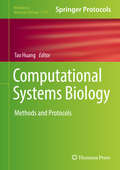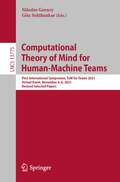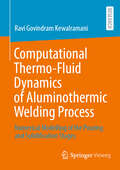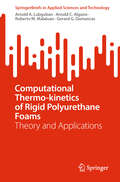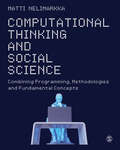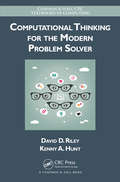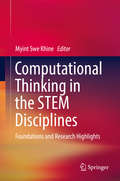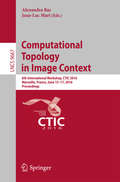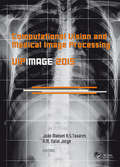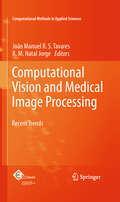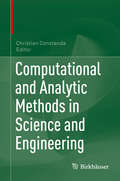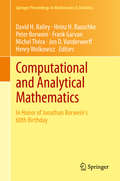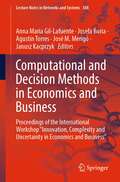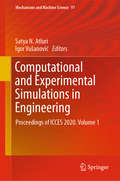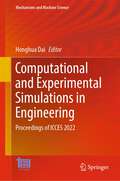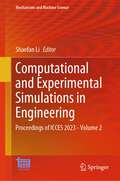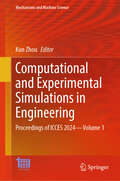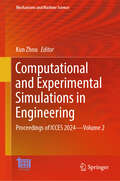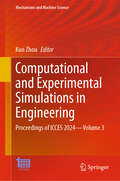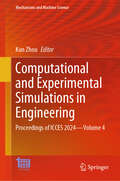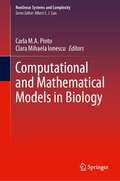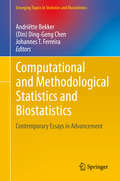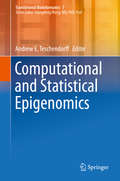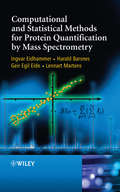- Table View
- List View
Computational Systems Biology: Methods And Protocols (Methods In Molecular Biology #1754)
by Tao HuangThis volume introduces the reader to the latest experimental and bioinformatics methods for DNA sequencing, RNA sequencing, cell-free tumour DNA sequencing, single cell sequencing, single-cell proteomics and metabolomics. Chapters detail advanced analysis methods, such as Genome-Wide Association Studies (GWAS), machine learning, reconstruction and analysis of gene regulatory networks and differential coexpression network analysis, and gave a practical guide for how to choose and use the right algorithm or software to handle specific high throughput data or multi-omics data. Written in the highly successful Methods in Molecular Biology series format, chapters include introductions to their respective topics, lists of the necessary materials and reagents, step-by-step, readily reproducible laboratory protocols, and tips on troubleshooting and avoiding known pitfalls.Authoritative and cutting-edge, Computational Systems Biology: Methods and Protocols aims to ensure successful results in the further study of this vital field.
Computational Theory of Mind for Human-Machine Teams: First International Symposium, ToM for Teams 2021, Virtual Event, November 4–6, 2021, Revised Selected Papers (Lecture Notes in Computer Science #13775)
by Gita Sukthankar Nikolos GurneyThis book constitutes the proceedings of the First International Symposium, ToM for Teams 2021, held in Washington, DC, USA, during November 4–6, 2021, Each chapter in this section tackles a different aspect of AI representing the thoughts and beliefs of human agents. The work presented herein represents our collective efforts to better understand ToM, develop AI with ToM capabilities (ASI), and study how to integrate such systems into human teams.
Computational Thermo-Fluid Dynamics of Aluminothermic Welding Process: Numerical Modelling of the Pouring and Solidification Stages
by Ravi Govindram KewalramaniThe aluminothermic (AT) welding process, also known as Thermit welding, is an essential process for joining and repairing rails due to its simplicity, robustness, portability and economic usage. This book presents a multi-fluid, multiphase numerical model to predict the thermal flow field within the mould during the pouring and solidification stages of the AT welding process, developed using the finite volume method-based open-source CFD software OpenFOAM. The numerical model is rigorously validated not only against well-documented cases in the literature but also through an in-house, low-cost experiment designed to investigate the temporal and spatial evolution of the solid-liquid interface front during the melting of paraffin wax in a rectangular enclosure in the presence of a gas phase. The simulation results show good agreement with the validation cases. Moreover, insights into the thermal pouring stage with solid-liquid phase change phenomena are provided. For this purpose, the available k − ε turbulence model is also extended to incorporate the solid-liquid phase change phenomena. Finally, the temporal and spatial evolution of the solid-liquid interface front during the solidification stage is examined, and the influence of initial molten metal temperature and thermophysical properties on the final weld profiles is systematically studied.
Computational Thermo-kinetics of Rigid Polyurethane Foams: Theory and Applications (SpringerBriefs in Applied Sciences and Technology)
by Arnold A. Lubguban Roberto M. Malaluan Gerard G. Dumancas Arnold C. AlgunoThis book presents a detailed exploration of advanced computational modeling techniques in the design, testing, and applications of rigid polyurethane foams (RPUFs). By leveraging modern approaches such as database-driven predictions, iterative simulations, and emerging innovations in computational material engineering, it offers a more accurate and efficient way to model the thermo-kinetic behavior of RPUFs. The necessity for computational tools in materials science is intertwined with the growth of the polyurethane market, with many academic and industrial researchers seeking to adopt these methods. The book comprehensively discusses the advancement in bridging the gap between traditional empirical methods and cutting-edge computational techniques specifically applied to RPUFs. Furthermore, it is a comprehensive guide to the computational modeling of the thermo-kinetics of RPUFs, making it an essential resource for researchers, engineers, and academicians seeking to innovate in material science and engineering. This book addresses a niche yet critical area within this broader scope.
Computational Thinking and Social Science: Combining Programming, Methodologies and Fundamental Concepts
by Matti NelimarkkaWhilst providing a fundamental understanding of computational social science, this book delves into the tools and techniques used to build familiarity with programming and gain context into how, why and when they are introduced. The overall focus is on helping you understand and design computational social science research, alongside delving into hands-on coding and technical instruction. Key features include: Further reading Exercises accompanied by sample code Programming examples in Scratch, Python and R Key concepts Chapter summaries With experience in course design and teaching, Matti Nelimarkka has a deep understanding of learning techniques within computational social sciences, with the main aim of blending researching, thinking and designing together to gain a grounded foundation for coding, programming, methodologies and key concepts.
Computational Thinking and Social Science: Combining Programming, Methodologies and Fundamental Concepts
by Matti NelimarkkaWhilst providing a fundamental understanding of computational social science, this book delves into the tools and techniques used to build familiarity with programming and gain context into how, why and when they are introduced. The overall focus is on helping you understand and design computational social science research, alongside delving into hands-on coding and technical instruction. Key features include: Further reading Exercises accompanied by sample code Programming examples in Scratch, Python and R Key concepts Chapter summaries With experience in course design and teaching, Matti Nelimarkka has a deep understanding of learning techniques within computational social sciences, with the main aim of blending researching, thinking and designing together to gain a grounded foundation for coding, programming, methodologies and key concepts.
Computational Thinking for the Modern Problem Solver (Chapman & Hall/CRC Textbooks in Computing)
by David Riley Kenny A. HuntThrough examples and analogies, Computational Thinking for the Modern Problem Solver introduces computational thinking as part of an introductory computing course and shows how computer science concepts are applicable to other fields. It keeps the material accessible and relevant to noncomputer science majors.With numerous color figures, this class
Computational Thinking in the STEM Disciplines: Foundations And Research Highlights
by Myint Swe KhineThis book covers studies of computational thinking related to linking, infusing, and embedding computational thinking elements to school curricula, teacher education and STEM related subjects. Presenting the distinguished and exemplary works by educators and researchers in the field highlighting the contemporary trends and issues, creative and unique approaches, innovative methods, frameworks, pedagogies and theoretical and practical aspects in computational thinking. A decade ago the notion of computational thinking was introduced by Jeannette Wing and envisioned that computational thinking will be a fundamental skill that complements to reading, writing and arithmetic for everyone and represents a universally applicable attitude. The computational thinking is considered a thought processes involved in a way of solving problems, designing systems, and understanding human behaviour. Assimilating computational thinking at young age will assist them to enhance problem solving skills, improve logical reasoning, and advance analytical ability - key attributes to succeed in the 21st century. Educators around the world are investing their relentless effort in equipping the young generation with real-world skills ready for the demand and challenges of the future. It is commonly believed that computational thinking will play a pivotal and dominant role in this endeavour. Wide-ranging research on and application of computational thinking in education have been emerged in the last ten years. This book will document attempts to conduct systematic, prodigious and multidisciplinary research in computational thinking and present their findings and accomplishments.
Computational Topology in Image Context: 6th International Workshop, CTIC 2016, Marseille, France, June 15-17, 2016, Proceedings (Lecture Notes in Computer Science #9667)
by Alexandra Bac Jean-Luc MariThis book constitutes the proceedings of the 6th International Workshop on Computational Topology in Image Context, CTIC 2016, held in Marseille, France, in June 2016. The 24 papers presented in this volume were carefully reviewed and selected from 35 submissions. Additionally, this volume contains 2 invited papers. CTIC covers a wide range of topics such as: topological invariants and their computation, homology, cohomology, linking number, fundamental groups; algorithm optimization in discrete geometry, transfer of mathematical tools, parallel computation in multi-dimensional volume context, hierarchical approaches; experimental evaluation of algorithms and heuristics; combinatorial or multi-resolution models; discrete or computational topology; geometric modeling guided by topological constraints; computational topological dynamics; and use of topological information in discrete geometry applications.
Computational Vision and Medical Image Processing V: Proceedings of the 5th Eccomas Thematic Conference on Computational Vision and Medical Image Processing (VipIMAGE 2015, Tenerife, Spain, October 19-21, 2015)
by João Manuel R.S. Tavares R.M. Natal JorgeVipIMAGE 2015 contains invited lectures and full papers presented at VIPIMAGE 2015 - V ECCOMAS Thematic Conference on Computational Vision and Medical Image Processing (Tenerife, Canary Islands, Spain, 19-21 October, 2015). International contributions from 19 countries provide a comprehensive coverage of the current state-of-the-art in the fields o
Computational Vision and Medical Image Processing: Recent Trends (Computational Methods in Applied Sciences #19)
by Joao Tavares R. M. JorgeThis book contains extended versions of papers presented at the international Conference VIPIMAGE 2009 - ECCOMAS Thematic Conference on Computational Vision and Medical Image, that was held at Faculdade de Engenharia da Universidade do Porto, Portugal, from 14th to 16th of October 2009. This conference was the second ECCOMAS thematic conference on computational vision and medical image processing. It covered topics related to image processing and analysis, medical imaging and computational modelling and simulation, considering their multidisciplinary nature. The book collects the state-of-the-art research, methods and new trends on the subject of computational vision and medical image processing contributing to the development of these knowledge areas.
Computational and Analytic Methods in Science and Engineering: Computational And Analytic Aspects
by Christian ConstandaThis contributed volume collects papers presented at a special session of the conference Computational and Mathematical Methods in Science and Engineering (CMMSE) held in Cadiz, Spain from June 30 - July 6, 2019. Covering the applications of integral methods to scientific developments in a variety of fields, ranging from pure analysis to petroleum engineering, the chapters in this volume present new results in both pure and applied mathematics. Written by well-known researchers in their respective disciplines, each chapter shares a common methodology based on a combination of analytic and computational tools. This approach makes the collection a valuable, multidisciplinary reference on how mathematics can be applied to various real-world processes and phenomena. Computational and Analytic Methods in Science and Engineering will be ideal for applied mathematicians, physicists, and research engineers.
Computational and Analytical Mathematics: In Honor of Jonathan Borwein's 60th Birthday (Springer Proceedings in Mathematics & Statistics #50)
by Jon D. Vanderwerff David H. Bailey Heinz H. Bauschke Peter Borwein Frank Garvan Michel Théra Henry WolkowiczThe research of Jonathan Borwein has had a profound impact on optimization, functional analysis, operations research, mathematical programming, number theory, and experimental mathematics. Having authored more than a dozen books and more than 300 publications, Jonathan Borwein is one of the most productive Canadian mathematicians ever. His research spans pure, applied, and computational mathematics as well as high performance computing, and continues to have an enormous impact: MathSciNet lists more than 2500 citations by more than 1250 authors, and Borwein is one of the 250 most cited mathematicians of the period 1980-1999. He has served the Canadian Mathematics Community through his presidency (2000-02) as well as his 15 years of editing the CMS book series. Jonathan Borwein's vision and initiative have been crucial in initiating and developing several institutions that provide support for researchers with a wide range of scientific interests. A few notable examples include the Centre for Experimental and Constructive Mathematics and the IRMACS Centre at Simon Fraser University, the Dalhousie Distributed Research Institute at Dalhousie University, the Western Canada Research Grid, and the Centre for Computer Assisted Research Mathematics and its Applications, University of Newcastle. The workshops that were held over the years in Dr. Borwein's honor attracted high-caliber scientists from a wide range of mathematical fields. This present volume is an outgrowth of the workshop on 'Computational and Analytical Mathematics' held in May 2011 in celebration of Dr. Borwein's 60th Birthday. The collection contains various state-of-the-art research manuscripts and surveys presenting contributions that have risen from the conference, and is an excellent opportunity to survey state-of-the-art research and discuss promising research directions and approaches.
Computational and Decision Methods in Economics and Business: Proceedings of the International Workshop “Innovation, Complexity and Uncertainty in Economics and Business” (Lecture Notes in Networks and Systems #388)
by Anna Maria Gil-Lafuente Janusz Kacprzyk José M. Merigó Josefa Boria Agustín TorresThis book presents different topics related to innovation, complexity, uncertainty, modeling and simulation, fuzzy logic, decision-making, aggregation operators, business and economic applications, among others. The chapters are the results of research presented at the International Workshop "Innovation, Complexity and Uncertainty in Economics and Business", held in Barcelona, in November 2019, by The Ibero-American Network for Competitiveness, Innovation and Development (REDCID in Spanish) and the Royal Academy of Economic and Financial Sciences (RACEF in Spanish). These papers are useful for junior and senior researchers in the area of economics and business.
Computational and Experimental Simulations in Engineering: Proceedings of ICCES 2020. Volume 1 (Mechanisms and Machine Science #97)
by Satya N. Atluri Igor VušanovićThis book gathers the latest advances, innovations, and applications in the field of computational engineering, as presented by leading international researchers and engineers at the 26th International Conference on Computational & Experimental Engineering and Sciences (ICCES), held in Phuket, Thailand on January 6-10, 2021. ICCES covers all aspects of applied sciences and engineering: theoretical, analytical, computational, and experimental studies and solutions of problems in the physical, chemical, biological, mechanical, electrical, and mathematical sciences. As such, the book discusses highly diverse topics, including composites; bioengineering & biomechanics; geotechnical engineering; offshore & arctic engineering; multi-scale & multi-physics fluid engineering; structural integrity & longevity; materials design & simulation; and computer modeling methods in engineering. The contributions, which were selected by means of a rigorous international peer-review process, highlight numerous exciting ideas that will spur novel research directions and foster multidisciplinary collaborations.
Computational and Experimental Simulations in Engineering: Proceedings of ICCES 2022 (Mechanisms and Machine Science #119)
by Honghua DaiThis book gathers the latest advances, innovations, and applications in the field of computational engineering, as presented by leading international researchers and engineers at the 27th International Conference on Computational & Experimental Engineering and Sciences (ICCES), held online on January 8-12, 2022. ICCES covers all aspects of applied sciences and engineering: theoretical, analytical, computational, and experimental studies and solutions of problems in the physical, chemical, biological, mechanical, electrical, and mathematical sciences. As such, the book discusses highly diverse topics, including composites; bioengineering & biomechanics; geotechnical engineering; offshore & arctic engineering; multi-scale & multi-physics fluid engineering; structural integrity & longevity; materials design & simulation; and computer modeling methods in engineering. The contributions, which were selected by means of a rigorous international peer-review process, highlight numerous exciting ideas that will spur novel research directions and foster multidisciplinary collaborations.
Computational and Experimental Simulations in Engineering: Proceedings of ICCES 2023—Volume 2 (Mechanisms and Machine Science #145)
by Shaofan LiThis book gathers the latest advances, innovations, and applications in the field of computational engineering, as presented by leading international researchers and engineers at the 29th International Conference on Computational & Experimental Engineering and Sciences (ICCES), held in Shenzhen, China on May 26-29, 2023. ICCES covers all aspects of applied sciences and engineering: theoretical, analytical, computational, and experimental studies and solutions of problems in the physical, chemical, biological, mechanical, electrical, and mathematical sciences. As such, the book discusses highly diverse topics, including composites; bioengineering & biomechanics; geotechnical engineering; offshore & arctic engineering; multi-scale & multi-physics fluid engineering; structural integrity & longevity; materials design & simulation; and computer modeling methods in engineering. The contributions, which were selected by means of a rigorous international peer-review process, highlight numerous exciting ideas that will spur novel research directions and foster multidisciplinary collaborations.
Computational and Experimental Simulations in Engineering: Proceedings of ICCES 2024—Volume 1 (Mechanisms and Machine Science #168)
by Kun ZhouThis book gathers the latest advances, innovations, and applications in the field of computational engineering, as presented by leading international researchers and engineers at the 30th International Conference on Computational & Experimental Engineering and Sciences (ICCES), held in Singapore on August 3-6, 2024. ICCES covers all aspects of applied sciences and engineering: theoretical, analytical, computational, and experimental studies and solutions of problems in the physical, chemical, biological, mechanical, electrical, and mathematical sciences. As such, the book discusses highly diverse topics, including composites; bioengineering & biomechanics; geotechnical engineering; offshore & arctic engineering; multi-scale & multi-physics fluid engineering; structural integrity & longevity; materials design & simulation; and computer modeling methods in engineering. The contributions, which were selected by means of a rigorous international peer-review process, highlight numerous exciting ideas that will spur novel research directions and foster multidisciplinary collaborations.
Computational and Experimental Simulations in Engineering: Proceedings of ICCES 2024—Volume 2 (Mechanisms and Machine Science #173)
by Kun ZhouThis book gathers the latest advances, innovations, and applications in the field of computational engineering, as presented by leading international researchers and engineers at the 30th International Conference on Computational & Experimental Engineering and Sciences (ICCES), held in Singapore on August 3-6, 2024. ICCES covers all aspects of applied sciences and engineering: theoretical, analytical, computational, and experimental studies and solutions of problems in the physical, chemical, biological, mechanical, electrical, and mathematical sciences. As such, the book discusses highly diverse topics, including composites; bioengineering & biomechanics; geotechnical engineering; offshore & arctic engineering; multi-scale & multi-physics fluid engineering; structural integrity & longevity; materials design & simulation; and computer modeling methods in engineering. The contributions, which were selected by means of a rigorous international peer-review process, highlight numerous exciting ideas that will spur novel research directions and foster multidisciplinary collaborations.
Computational and Experimental Simulations in Engineering: Proceedings of ICCES 2024—Volume 3 (Mechanisms and Machine Science #175)
by Kun ZhouThis book gathers the latest advances, innovations, and applications in the field of computational engineering, as presented by leading international researchers and engineers at the 30th International Conference on Computational & Experimental Engineering and Sciences (ICCES), held in Singapore on August 3-6, 2024. ICCES covers all aspects of applied sciences and engineering: theoretical, analytical, computational, and experimental studies and solutions of problems in the physical, chemical, biological, mechanical, electrical, and mathematical sciences. As such, the book discusses highly diverse topics, including composites; bioengineering & biomechanics; geotechnical engineering; offshore & arctic engineering; multi-scale & multi-physics fluid engineering; structural integrity & longevity; materials design & simulation; and computer modeling methods in engineering. The contributions, which were selected by means of a rigorous international peer-review process, highlight numerous exciting ideas that will spur novel research directions and foster multidisciplinary collaborations.
Computational and Experimental Simulations in Engineering: Proceedings of ICCES 2024—Volume 4 (Mechanisms and Machine Science #176)
by Kun ZhouThis book gathers the latest advances, innovations, and applications in the field of computational engineering, as presented by leading international researchers and engineers at the 30th International Conference on Computational & Experimental Engineering and Sciences (ICCES), held in Singapore on August 3–6, 2024. ICCES covers all aspects of applied sciences and engineering: theoretical, analytical, computational, and experimental studies and solutions of problems in the physical, chemical, biological, mechanical, electrical, and mathematical sciences. As such, the book discusses highly diverse topics, including composites; bioengineering and biomechanics; geotechnical engineering; offshore and arctic engineering; multi-scale and multi-physics fluid engineering; structural integrity and longevity; materials design and simulation; and computer modeling methods in engineering. The contributions, which were selected by means of a rigorous international peer-review process, highlight numerous exciting ideas that will spur novel research directions and foster multidisciplinary collaborations.
Computational and Mathematical Models in Biology (Nonlinear Systems and Complexity #38)
by Clara Mihaela Ionescu Carla M. A. PintoThis book provides the most valuable and updated research on computational and mathematical models in biological systems from influential researchers around the world and contributes to the development of future research guidelines in this topic. Topics include (but are not limited to): modeling infectious and dynamic diseases; regulation of cell function; biological pattern formation; biological networks; tumor growth and angiogenesis; complex biological systems; Monte Carlo methods; Control theory, optimization and their applications
Computational and Methodological Statistics and Biostatistics: Contemporary Essays in Advancement (Emerging Topics in Statistics and Biostatistics)
by Din Ding-Geng Chen Andriëtte Bekker Johannes T. FerreiraIn the statistical domain, certain topics have received considerable attention during the last decade or so, necessitated by the growth and evolution of data and theoretical challenges. This growth has invariably been accompanied by computational advancement, which has presented end users as well as researchers with the necessary opportunities to handle data and implement modelling solutions for statistical purposes.Showcasing the interplay among a variety of disciplines, this book offers pioneering theoretical and applied solutions to practice-oriented problems. As a carefully curated collection of prominent international thought leaders, it fosters collaboration between statisticians and biostatisticians and provides an array of thought processes and tools to its readers. The book thereby creates an understanding and appreciation of recent developments as well as an implementation of these contributions within the broader framework of both academia and industry.Computational and Methodological Statistics and Biostatistics is composed of three main themes:• Recent developments in theory and applications of statistical distributions;• Recent developments in supervised and unsupervised modelling;• Recent developments in biostatistics;and also features programming code and accompanying algorithms to enable readers to replicate and implement methodologies. Therefore, this monograph provides a concise point of reference for a variety of current trends and topics within the statistical domain. With interdisciplinary appeal, it will be useful to researchers, graduate students, and practitioners in statistics, biostatistics, clinical methodology, geology, data science, and actuarial science, amongst others.
Computational and Statistical Epigenomics (Translational Bioinformatics #7)
by Andrew E. TeschendorffThis book introduces the reader to modern computational and statistical tools for translational epigenomics research. Over the last decade, epigenomics has emerged as a key area of molecular biology, epidemiology and genome medicine. Epigenomics not only offers us a deeper understanding of fundamental cellular biology, but also provides us with the basis for an improved understanding and management of complex diseases. From novel biomarkers for risk prediction, early detection, diagnosis and prognosis of common diseases, to novel therapeutic strategies, epigenomics is set to play a key role in the personalized medicine of the future. In this book we introduce the reader to some of the most important computational and statistical methods for analyzing epigenomic data, with a special focus on DNA methylation. Topics include normalization, correction for cellular heterogeneity, batch effects, clustering, supervised analysis and integrative methods for systems epigenomics. This book will be of interest to students and researchers in bioinformatics, biostatistics, biologists and clinicians alike. Dr. Andrew E. Teschendorff is Head of the Computational Systems Genomics Lab at the CAS-MPG Partner Institute for Computational Biology, Shanghai, China, as well as an Honorary Research Fellow at the UCL Cancer Institute, University College London, UK.
Computational and Statistical Methods for Protein Quantification by Mass Spectrometry
by Ingvar Eidhammer Geir Egil Eide Harald Barsnes Lennart MartensThe definitive introduction to data analysis in quantitative proteomicsThis book provides all the necessary knowledge about mass spectrometry based proteomics methods and computational and statistical approaches to pursue the planning, design and analysis of quantitative proteomics experiments. The author's carefully constructed approach allows readers to easily make the transition into the field of quantitative proteomics. Through detailed descriptions of wet-lab methods, computational approaches and statistical tools, this book covers the full scope of a quantitative experiment, allowing readers to acquire new knowledge as well as acting as a useful reference work for more advanced readers.Computational and Statistical Methods for Protein Quantification by Mass Spectrometry:Introduces the use of mass spectrometry in protein quantification and how the bioinformatics challenges in this field can be solved using statistical methods and various software programs.Is illustrated by a large number of figures and examples as well as numerous exercises.Provides both clear and rigorous descriptions of methods and approaches.Is thoroughly indexed and cross-referenced, combining the strengths of a text book with the utility of a reference work.Features detailed discussions of both wet-lab approaches and statistical and computational methods.With clear and thorough descriptions of the various methods and approaches, this book is accessible to biologists, informaticians, and statisticians alike and is aimed at readers across the academic spectrum, from advanced undergraduate students to post doctorates entering the field.
